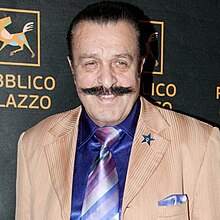
Back ソビエト関連の事物に由来する人名 Japanese Имена советского происхождения Russian Sovyet kökenli isimler Turkish Імена радянського походження Ukrainian

Given names of Soviet origin appeared in the early history of the Soviet Union,[3] coinciding with the period of intensive word formation, both being part of the so-called "revolutionary transformation of the society" with the corresponding fashion of neologisms and acronyms,[4] which Richard Stites characterized as a utopian vision of creating a new reality by means of verbal imagery.[3] They constituted a notable part of the new Soviet phraseology.
Such names may be primarily found in Russian persons,[5] and sometimes in Belarusians and Ukrainians,[6] as well as in other minorities of the former USSR (e.g. Tatar[7]).
- ^ Dmitry Gordon (2006). Диалог длиною в жизнь: беседы с великими и знаменитыми. Izdatelʹskiĭ Dom "Skhili Dnipra".
Anne Nivat (2014). "Chapter 21. Wing A. Entryway 9, Third Floor: Willy and Julia Tokarev". The View from the Vysotka: A Portrait of Russia Today Through One of Moscow's Most Famous Addresses. St. Martin's Press. ISBN 9781466865815. - ^ Aleksandr Kazakevich (2009-09-27). "Вилли ТОКАРЕВ: "Когда тебя подгоняют, надо говорить "О'кей", и делать по-своему…"".
- ^ a b Richard Stites, Revolutionary Dreams: Utopian Vision and Experimental Life in the Russian Revolution, p. 111
- ^ Valeri Mokiyenko, Tatyana Nikitina "Толковый словарь языка Совдепии" ("Explanatory Dictionary of Sovdepiya"), St.Petersburg, Фолио-Пресс, 1998, ISBN 5-7627-0103-4.
- ^ Петровский, Н. А. "Словарь русских личных имён", Moscow, АСТ, 2000, ISBN 5-17-002940-3.
- ^ Скрипник, Л.Г., Дзятківська, Н.П. Власні імена людей. — Kyiv, Naukova Dumka, 2005, ISBN 9660005504
- ^ Gumar Sattarov, "What Tatar Names Tell Us About?" (Гомђр Саттар-Мулилле. "Татар исемнђре ни сљйли?" - Kazan: "Rannur" Publishers, 1998, 488 pp.)